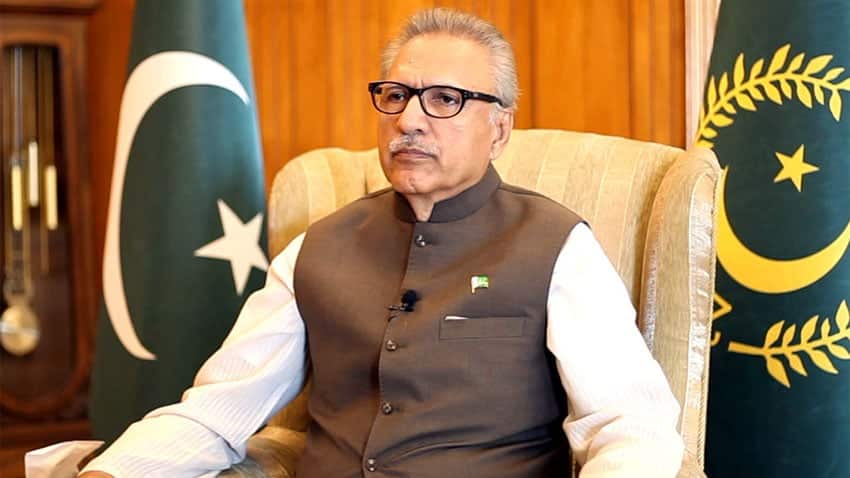President Dr. Arif Alvi announced on Monday that elections in Khyber Pakhtunkhwa and Punjab would be placed on April 9, despite the Election Commission of Pakistan (ECP) delaying the announcement of the date.
The President announced the date using the authority entrusted to him by Section 57 (1) of the 2017 Elections Act.
By Section 57(2) of the Act, he also demanded that the electoral board publish an election program.
After criticizing ECP’s “poignant approach,” the President invited Chief Election Commissioner (CEC) Sikandar Sultan Raja for an emergency meeting on Monday, February 20, to discuss the election date.
However, the election commission declined to meet President Alvi, citing that a judge was already reviewing the situation.
In a letter to Chief Election Commissioner (CEC) Sikander Sultan Raja, the President declared that he had taken an oath to respect, defend, and protect the Constitution by Article 42, read with the third schedule.
He said that since no court had issued a restraining order, he could utilize the authority conferred by Section 57 (1) of the Elections Act of 2017, which permits him to “announce the date or dates of the general elections following consultation with the Commission.”
Read: President Alvi calls an “urgent” meeting with CEC on general election dates
To prevent an infringement and violation of the Constitution and the law, the President claimed he was compelled to fulfill his legal and constitutional duties to announce the election date. e. At least ninety days must elapse before elections can be held.
As required by the Constitution, the President stated that the governors of Punjab and KP were not meeting their constitutional requirements to designate a date no later than 90 days after the dissolution of the provincial parliament.
In addition, he stated that the ECP was not executing its constitutional obligation to conduct elections for the Punjab and KP assemblies.
An old Urdu adage states, “Both constitutional offices are putting the ball in the other’s court, which causes delay and creates a significant chance that constitutional requirements would be violated.”
He noted that the election monitor had already presented potential election dates in multiple conversations with constitutional officials, proving its responsibility to arrange the elections within ninety days.
Read: ECP expects a “better choice of words” from President Alvi
To declare the date for the general elections of the legislatures above, the President indicated that he had initiated a serious consultation process with the ECP by Section 57 (1) of the Elections Act of 2017. However, the ECP answered that the commission could not attend a meeting with the White House to discuss the subject.
While talking to local news channel Geo News’, Talal Chaudhary, a senior Pakistan Muslim League-Nawaz member (PML-N) member, stated that the election could not and would not be held on the President’s orders. “.
He lambasted Imran Khan, the Pakistan Tehreek-e-Insaf (PTI) leader, for wanting to “become the president of the country,” stating that the actual President should be aware of his duties.
Chaudhary stated that the President lacks the constitutional authority to select the election date.
He should avoid making fun of the presidency and the country “, he remarked.
In addition, the former state minister for the interior argued that Pakistan required elections that suited the nation’s needs rather than those of Imran Khan.
He said, “The Constitution has an appropriate method for having elections,” and asserted that President Alvi abused his power by “making the elections contentious.”
When asked if the PML-N planned to take the case to court, the PML-N leader stated that it would be foolish to do so because the ruling was without value, to begin with.
He explained that the issue was not that the PML-N was afraid of elections — “we were not even terrified of martial law” — but that Khan’s whims could not be accommodated.
He stated, “We have already launched our election campaign; Maryam Nawaz is touring every district and holding meetings and conventions, and we are prepared to manage them.”
When questioned if it was feasible that the polls would be held in compliance with the President’s instruction, Chaudhry fiercely denied the prospect and insisted that the ECP would uphold its obligations.
He stated that he had already begun making the elections divisive because the President appeared to be Khan’s stooge.
Senior PML-N leader and Federal Minister for Planning and Development Ahsan Iqbal responded to the political development by stating that the ECP has the authority to set the election date. He believed the President had no right to publicize the date.
The minister indicated it would take one to two years to lead Pakistan out of its current economic turmoil.
He said the coalition government was trying to bring the country back on track. However, according to him, export growth is the topic of specific initiatives.
Raza Rabbani, a former Senate chairman and senior leader of the Pakistan Peoples Party, asserted that the President lacked the authority to decide.
Legal authorities recommend that the governor proclaim the date while ECP handles the arrangements. But, the governor can only specify the date after authorizing the dissolution papers. Moreover, the governor signed the document in KP but not Punjab. Thus, the subject remains debatable.






